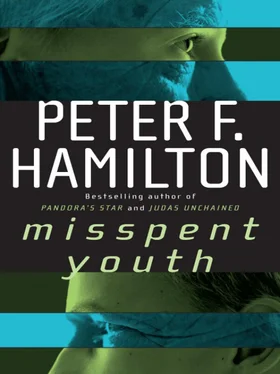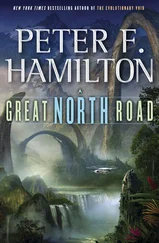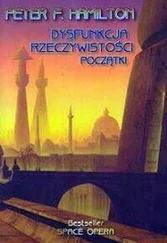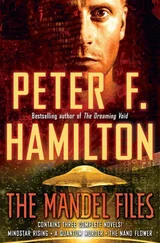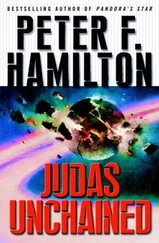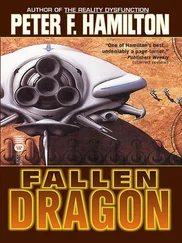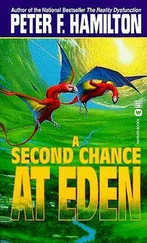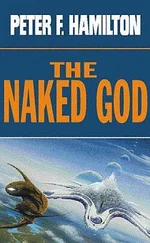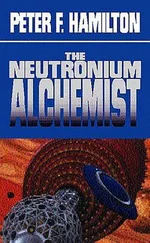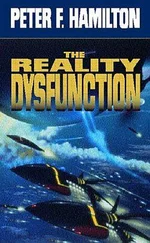“Are we going out for lunch?” Alison asked as she led him through the chaos that was her living room. Every wall was covered in big stainless-steel poster frames, holding blowups of the fantasy books she used to write. Nubile women in brass bikinis—or less—clung to bronzed, muscle-bound men as they fought off wyrms and goblin hordes with magic glowing swords; gloomy forests and dark castles tended to feature heavily in the background. The scenes had always inspired Tim when he was younger. He’d even loyally read a couple of Alison’s books, though he preferred straight science fiction himself.
“No. I was just coming to see you about dad and next Tuesday.”
“Oh right.” Alison went out onto the patio. “You remember Graham, don’t you, Tim?”
“Sure.”
Graham Joyce was sitting in one of the sunloungers. He leaned forward and gave Tim a firm handshake. “Tim, greetings and salutations.” For a man in his eighties he retained a remarkably vigorous air, possessing a gaunt face that genoprotein treatments had never quite managed to soften and a shock of unruly snow-white hair. His voice was like a forceful foghorn.
Tim smiled. “Hiya.” The old novelist was one of his favorite adults, even more disreputable than Alison, if such a thing were possible. Graham had won the last Booker Prize, back in 2012, as the publishing houses collapsed in tandem with the copyright laws. That didn’t make him as famous as Jeff Baker; these days novelists belonged to the same chunk of history as Hollywood and rock and roll, but Tim had plenty of respect for Graham. It was more than just the elder statesman thing; he always spoke with such passion that it was impossible to doubt what he said.
“What are you two cooking up?” Tim asked.
“Murder! Revolution! Martyrdom!” Graham chuckled, a sound like an aggressive avalanche. “Going to join us?”
“I’ll give it a miss, thanks. I’m seeing my girlfriend later.”
“How is Zai?” Alison asked.
Tim winced. “Annabelle.”
“God, you’re as bad as your father,” Alison said. She settled back into her own sunlounger and picked up a tall glass of gin and tonic. “I remember what he was like back in the seventies and eighties. Not that the nineties were much better. I had to be very careful about introducing him to my girlfriends. He tried to get most of them into bed.”
Tim was fascinated by this sudden revelation of parental behavior. “Really?”
“Pay no heed, Tim,” Graham commanded. “Alison’s so-called history is all feminist revisionism. Your father was a fine bloke. I’ll overlook the fact he annihilated my world and cast all us delicate sensitive artistic types into eternal purgatory. So who is Annabelle?”
“She’s a friend. Lives over in Uppingham. I really like her.”
“Good for you. Is she pretty?”
“So much!” Tim looked around the patio. The wisteria creepers that twined round the awning poles were in full flower. Alison’s garden was shaggier than those of her neighbors, but it was just as attractive. And the view across the water as the sun shone on the ripples was fabulous. “Do you really think you’re in purgatory?”
“Come on, you know we were the lucky ones, Tim,” Alison said. “The only reason I can afford to live in this dreadful ghetto is because I made a mint writing…what do you call it? Pre10. Yes, pre10 console games.”
“Right.” Tim produced a mildly awkward grin. He’d grown up with every byte in the datasphere being free. That was the natural way of things; instant unlimited access to all files was a fundamental human right. Restriction was the enemy. Evil. Governments restricted information cloaking their true behavior from the media and public, although enough of it leaked out anyway. He’d never really thought of the economic fallout from the macro storage capability delivered by crystal memories. It was a simple enough maxim: Everything that can be digitized can be stored and distributed across the datasphere, every file can be copied a million, a billion, times over. Once it has been released into the public domain, it can never be recalled, providing a universal open-source community.
After the turn of the century, as slow phone line connections were replaced by broadband cables into every home, and crystal memories took over from sorely limited hard drives and rewritable CDs, more and more information was liberated from its original and singular owners. The music industry, always in the forefront of the battle against open access, was the first to crumble. Albums and individual tracks were already available in a dozen different electronic formats, ready to be traded and swapped. Building up total catalogue availability took hardly any time at all.
As ultra-high-definition screens hit the market, paper books were scanned in, or had their e-book version’s encryption hacked. Films were downloaded as soon as they hit the cinema, and on a few celebrated occasions actually before they premiered.
All of these media were provided free through distributed source networks established by anonymous enthusiasts and fanatics—even a few dedicated anticapitalists determined to burn Big Business and stop them from making “excessive profits.” Lawyers and service providers tried to stamp it out. At first they tried very hard. But there was no longer a single source site to quash, no one person to threaten with fines and prison. Information evolution meant that the files were delivered from uncountable computers that simply shared their own specialist subject architecture software. The Internet had long ago destroyed geography. Now the datasphere removed individuality from the electronic universe, and with it responsibility.
Excessive profits took the nosedive every open-source, Marxist, and Green idealist wanted. Everybody who’d ever walked into a shop and grumbled about the price of a DVD or CD finally defeated the rip-off retailer and producer, accessing whatever they wanted for free. Record companies, film studios, and publishers saw their income crash dramatically. By 2009 band managers could no longer afford to pay for recording time, session musicians, promotional videos, and tours. There was no money coming in from the current blockbusters to invest in the next generation, and certainly no money for art films. Writers could still write their books, but they’d never be paid for them; the datasphere snatched them away the instant the first review copy was sent out. New games were hacked and sent flooding through the datasphere like electronic tsunami for everyone to ride and enjoy. Even the BBC and other public service television companies were hit as their output was channeled directly into the datasphere; nobody bothered to pay their license fee anymore. Why should they?
After 2010, the nature of entertainment changed irrevocably, conforming to the datasphere’s dominance. New songs were written and performed by amateurs. Professional writers either created scripts for commercial cable television or went back to the day job and released work for free, while nonprofessional writers finally got to expose their rejected manuscripts to the world—which seemed as unappreciative as editors always had. Games were put together by mutual interest teams, more often than not modifying and mixing pre10 originals. Hollywood burned. With the big time over, studios diverted their dwindling resources into cable shows, soaps, and series; they didn’t even get syndication and Saturday morning reruns anymore, let alone DVD rental fees and sales. Everything was a one-off released globally, sponsored by commercials and product placement.
It was a heritage Tim had never considered in any detail. Then a couple of years back he’d watched Dark Sister , the adaptation of one of Graham’s novels. The pre10 film was spooky and surprisingly suspenseful, and he’d made the error of telling Graham he quite liked it. The novelist’s response wasn’t what he expected. Graham held his hand out and said: “That’ll be five euros, please.”
Читать дальше
